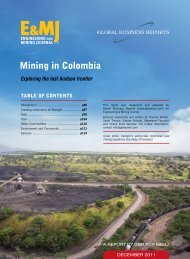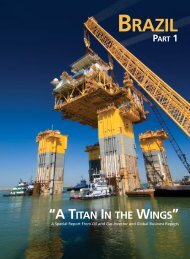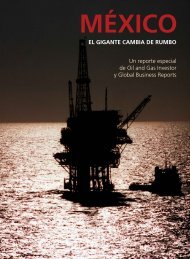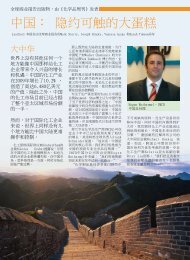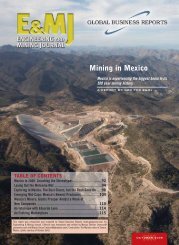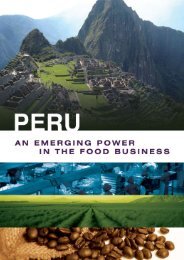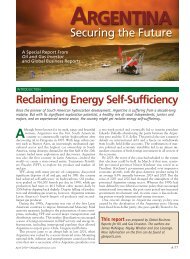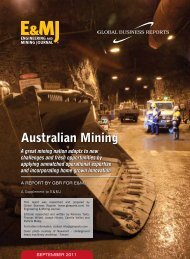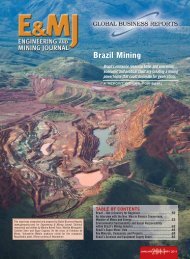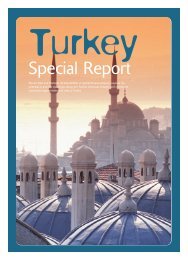Indonesia Mining 2012 - GBR
Indonesia Mining 2012 - GBR
Indonesia Mining 2012 - GBR
You also want an ePaper? Increase the reach of your titles
YUMPU automatically turns print PDFs into web optimized ePapers that Google loves.
<strong>Mining</strong> IN <strong>Indonesia</strong><br />
market could potentially be more profitable<br />
than exportation in the future. “The domestic<br />
demand for energy, particularly coal, will<br />
continue to grow in the years to come. The<br />
coal industry is already beginning to see a<br />
lot more maturity in the local market. <strong>Indonesia</strong>’s<br />
growing industrial sector has increasing<br />
electricity requirements that must<br />
be satisfied. With the price of ‘industrial’<br />
diesel fuel, which is directly linked to the<br />
crude oil market, being a cause for concern<br />
for much of the private and public sectors,<br />
more domestic companies are transitioning<br />
to coal. This creates a very attractive opportunity<br />
for PT Apple Coal. Moreover, by supplying<br />
the domestic market, we do not have<br />
to worry about exchange rate fluctuations<br />
reducing the profitability of our operations,<br />
and all of our transactions can be done in<br />
Rupiah. I am very bullish on the <strong>Indonesia</strong>n<br />
domestic market.”<br />
Environmental Integrity and<br />
<strong>Indonesia</strong>’s Coal Boom<br />
Although the remarkable growth of the<br />
country’s coal mining industry has been a<br />
source of pride and wealth for both international<br />
and <strong>Indonesia</strong>n businessmen, many<br />
individuals are worried about its long-term<br />
repercussions. The most worrisome concern<br />
for many in <strong>Indonesia</strong>’s mining community<br />
is the environmental degradation that has<br />
taken place due to the mining activities of<br />
small-scale, unprofessional miners.<br />
In an effort to address these issues,<br />
the <strong>Indonesia</strong>n Coal <strong>Mining</strong> Association,<br />
an organization representing 130 of the<br />
country’s most influential coal miners, has<br />
set out an ambitious plan to ensure that<br />
all coal mining operations are conducted<br />
in the most professional manner possible.<br />
Most of <strong>Indonesia</strong>n coal mining is opencast,<br />
not underground, and carried out in<br />
remote areas of the country’s lush green<br />
Wahana coal mine east pit. Photo courtesy of Leighton Contractors.<br />
virgin forest, increasing the likelihood of<br />
environmental damage. “The <strong>Indonesia</strong>n<br />
Coal <strong>Mining</strong> Association’s members have<br />
a policy to mine and reclaim in any mining<br />
operation they take part in. Along with<br />
the Ministry of Forestry, we are supporting<br />
the planting of numerous new trees: within<br />
a 10,000 hectare coal concession only a<br />
maximum of 400 hectares will be mined<br />
at any one time; this area will then be reclaimed<br />
before we move on to the next mining<br />
area of 200 hectares to 400 hectares,”<br />
said Bob Kamandanu, chairman, the <strong>Indonesia</strong>n<br />
Coal <strong>Mining</strong> Association.<br />
Kamandanu attributes the unethical<br />
mining practices of some miners to the<br />
2009 <strong>Mining</strong> Law, which has allowed for<br />
smaller, less-reputable mining companies<br />
to enter the country’s coal space. “The<br />
purpose of the 2009 <strong>Mining</strong> Law was to<br />
re-vamp the system but it has opened the<br />
mining industry to irresponsible mining<br />
practices, giving the industry a bad image.<br />
The introduction of decentralization was<br />
premature; the big contracts are negotiated<br />
with central government but small licenses<br />
are channeled through local government<br />
resulting in small licenses being issued<br />
without the necessary governmental explorations<br />
and environmental checks.”<br />
With their effort to take part in the<br />
reclamation process, the <strong>Indonesia</strong>n Coal<br />
<strong>Mining</strong> Association is looking to shape the<br />
country’s mining industry for the decades<br />
to come. “In <strong>Indonesia</strong> I would like to see<br />
the coal industry properly regulated with<br />
total production of the industry being registered<br />
with the government; consolidating<br />
all output. <strong>Mining</strong> exploration in <strong>Indonesia</strong><br />
should be large projects and supported<br />
financially by the right amount of investment,<br />
technical expertise, environmental<br />
reclamation, and corporate social responsibility,”<br />
said Kamandanu.<br />
Alan Hopkins, CEO, Pan Asia Corp.<br />
Perhaps the best way to express the<br />
commitment that miners should have with<br />
the land they operate is as Alan Hopkins,<br />
CEO, Pan Asia Corp, does: “mining is not<br />
a first date, it is a marriage. And when you<br />
marry the girl, you marry the family.”<br />
Hopefully, <strong>Indonesia</strong>n miners, large and<br />
small, will see the wisdom in this statement;<br />
to access the geological potential,<br />
they must agree to take on the burden of<br />
all the regulations and political realities that<br />
come with it.<br />
Underground coal mining<br />
<strong>Indonesia</strong><br />
Almost all coal mining operations in <strong>Indonesia</strong><br />
are open-pit. Nevertheless, this is<br />
slowly beginning to change as more companies<br />
begin to the see the benefit of engaging<br />
in underground mining. Speaking of<br />
some of the benefits of underground mining,<br />
Alan Hopkins, CEO of Pan Asia Corp,<br />
an ASX-listed mining junior with plans to<br />
operate an underground mine in central<br />
Kalimantan, said: “there is a much lighter<br />
environmental footprint on the ground using<br />
an underground operation and this fits with<br />
the current trend <strong>Indonesia</strong> seems to be following.<br />
With an underground operation we<br />
are unlocking new reserves for <strong>Indonesia</strong>,<br />
and we are having a lesser impact on all the<br />
other stakeholders.”<br />
In an effort to achieve this goal, Pan<br />
Asia has partnered up with KOPEX, an<br />
equipment provider specializing in underground<br />
mining, “KOPEX did trial mining<br />
in Kalimantan, and found the conditions<br />
to be viable for underground operations.<br />
They bring great expertise, access to good<br />
gear, and finance. Furthermore, they see<br />
underground <strong>Indonesia</strong> as a new thing to<br />
open up. Pan Asia’s mine could be the flagship<br />
for their underground operations in<br />
the country, and this could assist them to<br />
promote their abilities for other projects for<br />
other clients,” said Hopkins.<br />
www.e-mj.com E&MJ • JULY <strong>2012</strong> 59



